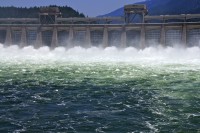Columbia Riverkeeper and Army Corps Reach Settlement to Slash Toxic Pollution in Columbia and Snake Rivers
August 4, 2014, Columbia Riverkeeper and partners celebrate a major victory in a year long effort to get the U.S. Army Corps of Engineers to clean-up their act on eight major dams in the Pacific Northwest.
In a legal settlement with Riverkeeper, the Army Corps agreed to address the oil pollution seeping from dams on the Columbia and Snake Rivers.
“This is a huge day for clean water,” said Brett VandenHeuvel, Columbia Riverkeeper’s Executive Director. “For years, the dams have discharged harmful oil pollution into the Columbia and Snake Rivers, and finally that will stop. With the dams coming into compliance with the Clean Water Act, hopefully we will see an end to toxic spills and chronic seepage of pollutants that have been harming our community.”
What’s next?
Highlights of the new settlement include:
- EPA oversight: Within one year, the Army Corps must apply to the U.S. Environmental Protection Agency (EPA) for Clean Water Act permits for eight of the largest dams on the Columbia and Snake Rivers. Currently, there is little to no oversight.
- Pollution limits: The Clean Water Act permits will limit the amount of oil and toxic pollution discharged by the dams.
- Pollution monitoring: For the first time the Army Corps must monitor the type and quantity of pollution being discharged into the largest rivers in the Pacific Northwest.
- Environmentally friendly oil: The Army Corps must complete an assessment of whether it is feasible to switch from using toxic petroleum products as lubricants in dams to using vegetable oil or other biodegradable oils. If it is feasible, the Army Corps must switch.

This victory was lauded by fishermen who like clean water and Clean Water Act experts who appreciate the lawsuit’s significance.
“Columbia Riverkeeper’s settlement has implications for dams operating without pollution permits across the country,” stated Melissa Powers, environmental law professor at Lewis and Clark Law School and expert in the federal Clean Water Act. “Like any industrial facility, dams are prohibited from discharging pollution until they obtain pollution permits.”
“Columbia Riverkeeper’s settlement demonstrates the power of citizen groups to hold government agencies accountable when other government regulators—here the U.S Environmental Protection Agency—sit on their hands,” stated Reed Super, an environmental attorney with over twenty years of experience who currently serves as the Legal Director for the international Waterkeeper Alliance. “Of course the Clean Water Act applies to federal facilities like hydroelectric dams that discharge oil pollution.”
“We rely on toxic-free fish to fuel business in communities along the Columbia and Snake Rivers. Columbia Riverkeeper’s work forcing the Corps to fess up to oil pollution from the dams and do something about it is critical to keeping Northwest rivers clean,” said Bob Rees, Columbia River fishing guide and Executive Director of the Association of Northwest Steelheaders.
“Some of the greatest kiteboarding in the world is downstream of dams like Bonneville, The Dalles, and John Day. Columbia Riverkeeper’s willingness to take the Army Corps to task for ignoring clean water laws helps protect a river that belongs to the public,” stated Jonathan Graca, an avid kiteboarder based in Hood River, Oregon.

Background
This decision comes a year after Columbia Riverkeeper first sued to end this unchecked pollution. The original suit described dozens of oil spills and chronic oil leaks at the dams. For example, in 2012, the Army Corps reported discharging over 1,500 gallons of PCB-laden transformer oil at the Ice Harbor Dam on the Snake River. According to the EPA, PCBs cause cancer, as well as a variety of other adverse health effects on the immune system, reproductive system, nervous system, and endocrine system. The oil from the Ice Harbor spill contained PCBs at levels 14,000,000% greater than state and federal chronic water quality standards.
Resources
- Press release: Columbia Riverkeeper and Army Corps Reach Settlement to End Uncontrolled Oil Pollution Seeping from Columbia and Snake River Dams.
- Proposed order with settlement agreement.
- “AP NewsBreak: Army Corps agrees to monitor oil pollution from dams in historic settlement” Nigel Duara, AP News, Aug. 4, 2014.
- “Oil-Leaking Dams Generate Concern” by Michael Milstein, The Oregonian, May 4, 2003.
- Summary of Columbia Riverkeeper Dams Settlement


